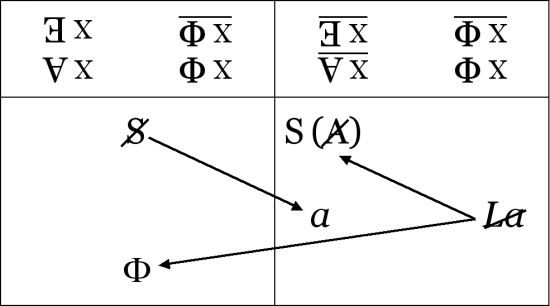Difference between revisions of "Formulae of sexuation"
m |
|||
| Line 1: | Line 1: | ||
| − | + | ||
| + | [[Image:DIAGRAM.jpg|center|The diagram of sexual difference]] | ||
In the [[seminars|seminar]] of [[chronology|1970-1]] [[Jacques Lacan]] tries to [[formalize]] his [[sexual difference|theory of sexual difference]] by means of [[mathemes|formulae]] derived from [[symbolic]] [[logic]]. | In the [[seminars|seminar]] of [[chronology|1970-1]] [[Jacques Lacan]] tries to [[formalize]] his [[sexual difference|theory of sexual difference]] by means of [[mathemes|formulae]] derived from [[symbolic]] [[logic]]. | ||
| Line 18: | Line 19: | ||
However, there is no symmetry between the two sides (no sexual relationship); eahc side represents a radically different way in which the [[sexual relationship]] can misfire.<ref>{{S20}} p.53-4</ref> | However, there is no symmetry between the two sides (no sexual relationship); eahc side represents a radically different way in which the [[sexual relationship]] can misfire.<ref>{{S20}} p.53-4</ref> | ||
| − | |||
| − | |||
Revision as of 21:38, 26 July 2006
In the seminar of 1970-1 Jacques Lacan tries to formalize his theory of sexual difference by means of formulae derived from symbolic logic.
The diagram is divided into two sides: on the left, the male side, and on the right, the female side.
The formulae of sexuation appear at the top of the diagram.
Thus the formulae on the male side are  (= there is at least one x which is not submitted to the phallic function) and
(= there is at least one x which is not submitted to the phallic function) and ![]() (= for all x, the phallic funciton is valid).
(= for all x, the phallic funciton is valid).
The formulae on the feamle side are ![]() (= there is not one x which is not submitted to the phallic function) and
(= there is not one x which is not submitted to the phallic function) and ![]() (= for not all x, the phallic function is valid).
(= for not all x, the phallic function is valid).
The last formula illustrates the relationship of woman to the logic of the not-all.
What is most striking is that the two propositions on each side of the diagram seem to contradict each other:
"Each side is defined by both an affirmation and a negation of the phallic funciton, an inclusion and exclusion of absolute (non-phallic) jouissance."[1]
However, there is no symmetry between the two sides (no sexual relationship); eahc side represents a radically different way in which the sexual relationship can misfire.[2]
- ↑ Copjec. 1994. p.24
- ↑ Lacan, Jacques. Le Séminaire. Livre XX. Encore, 1972-73. Ed. Jacques-Alain Miller. Paris: Seuil, 1975. p.53-4
